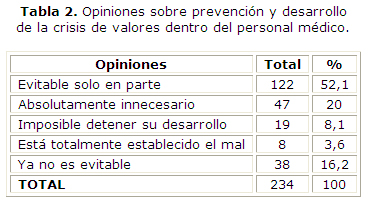Tomas's disease in Pinar del Rio health sector
Keywords:
Health personnel, Professional ethics.Abstract
Introduction: medical doctors, patients and society require the harmonic development of a contemporaneous ethic which responds to the demands of scientific, technical and cultural growth as well as to the socioeconomic and political transformations the present century entails.Objective: to determine the influence of Thomas's disease or Burn-out syndrome in 5 outpatient clinics and 2 dentistry clinics in Pinar del Rio and Consolacion del Sur municipalities during 2011.
Material and Method: a descriptive research was carried out considering the opinions of 234 professionals polled and a composed-survey that included 5 questions with 5 options in order to choice the most acceptable ones. Results were processed using descriptive statistics to determine the absolute and relative frequencies represented in tables.
Results: the answers were related to the current problems, a crisis in moral values reached 64,5% of the answers of professionals; more than 50% thought this crisis could be avoided in part, they recommended better wage conditions to strengthen motivations, in more than three-fifth parts and 32% considered humanistic formation of professionals should be better to improve the organization of health services. The 45,7% added that user-patient-institution relationship showed imperfections in its organization and recommended to pay attention to the collective analysis of problems to provide and strengthen moral values among the health workers, detecting this when more than 70% of the answers were summed up.
Conclusions: despite the demotivation that characterizes Thomas's disease, in view of the confidence in health professionals and the political will that direct the health work toward the excellence the disease can be prevented.
Downloads
References
1. Mora Reyes JC. La socialización ética y el sector de la salud: contradicciones y potencialidades en el momento Actual. Rev Inf Cient. [Internet]. 2011 [Citado 3 may 2012]; 71(3): [Aprox. 9p.]. Disponible en: http://www.gtm.sld.cu/sitios/cpicm/contenido/ric/textos/vol_71_No.3/socializacion_etica_tc.pdf
2. Organización de Naciones Unidas. Declaración Universal de Derechos Humanos en: Médicos. Pacientes. Sociedad. Buenos Aires. Argentina: EDIGRAF S.A; 1998.
3. Iglesias León M, Cortés Cortés M, Mur Villar N, Pérez Maya C, Aguilar Cordero MJ. La educación en valores en la Educación Superior. Medisur. [Internet]. 2010 [Citado 4 Jun.2012]; 8(6): [Aprox. 9p.]. Disponible en: http://medisur.sld.cu/index.php/medisur/article/view/1483/545
4. González Menéndez R. Humanismo y gestión de salud: pasado, presente y futuro. Rev. Cubana Salud Pública. [Internet]. 2006 [Citado 4 Jun.2012]; 32(4). Disponible en: http://scielo.sld.cu/scielo.php?pid=S0864-34662006000400006&script=sci_arttext
5. González Menéndez R. Humanismo, espiritualidad y ética médica. La Habana : Edit. Política; 2005.
6. González Menéndez R. La Enfermedad de Tomás. ¿Epidemia o Pandemia? (Carta al Director) World Psychiatry; 2006.
7. González Menéndez R. Humanismo y gestión de salud. ¿Avanzamos o retrocedemos? Rev. Psicopatología (España). [Internet]. 2000 [citado 3 Jun 2012]; 20(2): [Aprox. 15p.]. Disponible en:http://dialnet.unirioja.es/servlet/articulo?codigo=2826685
8. Amaro Cano MC. Ética Médica y Bioética. LA Habana: Edit. Ciencias Médicas; 2009.
9. Montano Díaz MA, Marín Suárez M. El método clínico y la ética profesional. Rev. Cienc Méd. Pinar Río. [Internet]. 2011 abr [citado 3 Jun 2012]; 15(2): [aprox. 6p.]. Disponible en: http://publicaciones.pri.sld.cu/rev-fcm/rev-fcm15-2/V15n2/250211.html
10.- Balaguer JR. La Batalla por la excelencia en los servicios de salud. La Habana: MINSAP; 2004.
11.- Sánchez Hernández AJ. Los valores ético morales desde una perspectiva psicológica. Humanidades Médicas. [Internet]. 2006 [citado 4 Jun 2012]; 6(3): [Aprox. 22p.]. Disponible en: http://scielo.sld.cu/scielo.php?script=sci_arttext&pid=S1727-81202006000300006&lng=es&nrm=iso&tlng=es
12. González Menéndez R. La epidemia emergente oculta de los profesionales de la salud en el siglo XXI. Rev. Hospital Psiquiátrico de la Habana. [Internet]. 2004 [citado 3 de Junio del 2012]; 1 (2-3). Disponible en: http://www.revistahph.sld.cu/hph0204/hph021304.htm
13. Estévez Álvarez N, Rivero Martínez N, Millán González E, Estévez Trujillo NM. Burnout y escalpelo. La astenia crónica en la práctica quirúrgica. Rev. Hospital Psiquiátrico de la Habana. [Internet]. 2010 [citado Citado 10 de Julio 2012]; 7 (3): [Aprox. 6p.]. Disponible en: http://www.revistahph.sld.cu/hph0310/hph09310.html
14. Aguirre del Busto RL. Teoría Social, reflexividad y medicina. Hacia un encuentro con la ética. Humanidades Médicas. [Internet]. 2006 [citado 4 Mayo 2012]; 6 (2): [aprox. 9p.]. Disponible en: http://scielo.sld.cu/scielo.php?script=sci_arttext&pid=S1727-81202006000200010
15. González R. Humanismo y gestión de salud en el siglo XXI. ¿Avanzamos o retrocedemos? Habana: Editorial de Ciencias Médicas; 2010. [citado 7 de agosto 2012]. Disponible en: http://www.bvs.sld.cu/libros/humanismo/humanismo_02enfermedad.pdf

Published
How to Cite
Issue
Section
License
Authors who have publications with this journal agree to the following terms: Authors will retain their copyrights and grant the journal the right of first publication of their work, which will be publication of their work, which will be simultaneously subject to the Creative Commons Attribution License (CC-BY-NC 4.0) that allows third parties to share the work as long as its author and first publication in this journal are indicated.
Authors may adopt other non-exclusive license agreements for distribution of the published version of the work (e.g.: deposit it in an institutional telematic archive or publish it in a volume). Likewise, and according to the recommendations of the Medical Sciences Editorial (ECIMED), authors must declare in each article their contribution according to the CRediT taxonomy (contributor roles). This taxonomy includes 14 roles, which can be used to represent the tasks typically performed by contributors in scientific academic production. It should be consulted in monograph) whenever initial publication in this journal is indicated. Authors are allowed and encouraged to disseminate their work through the Internet (e.g., in institutional telematic archives or on their web page) before and during the submission process, which may produce interesting exchanges and increase citations of the published work. (See The effect of open access). https://casrai.org/credit/


